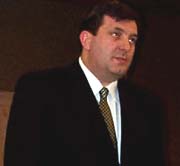The Future of Bosnia and Herzegovina: The Role of Republika Srpska
Prime Minister Milorad Dodik of Republika Srpska (RS), Bosnia and Herzegovina discussed the political balance in the RS, the future of Brcko, and refugee repatriation at a Current Issues Briefing on February 4, 1999. He emphasized that pragmatic leadership is necessary to continue the progress begun by the Dayton Peace Accords, and that while improvements have been made, many obstacles remain. There is now greater cross-border movement of people within Bosnia and Herzegovina, and multiethnic institutions have begun to grow. The international community, and especially the United States, has made a tremendous contribution to securing a peace agreement for Bosnia, and fostering the post-war development. Yet the Republika Srpska remains in dire economic straits, and desperately needs a generous amount of financial aid to pay the costs of refugee returns and facilitate the privatization of the economy. Nevertheless, the pace of political and economic progress is slow, and the legacy of conflict will take years to overcome. In this vein, PM Dodik stated his opposition to the ultra-nationalist parties of Serbia and the local opposition he faces from the President of the Republika Srpska.
Meanwhile, the return of refugees and displaced persons has been slow despite the removal of political obstacles to their return. This is exacerbated by the logistical problems of returning to one's previous home, and the social tensions still present in some areas, most notably Brcko. Refugee returns to Brcko have been significant, and plans are underway to demilitarize Brcko. In fact, PM Dodik suggested the need for a permanent presence of foreign troops in Bosnia, and the need to establish links with NATO through the Partnership for Peace. Thus, while acutely aware of the tenuous political balance within the Republika Srpska and the region at large, PM Dodik is hopeful that international support can bolster his administration and improve the lives of the people of Bosnia and Herzegovina.
Speakers
- Milorad Dodik
Prime Minister of Republika Srpska (RS), Bosnia and Herzegovina
Media Inquiries
Please contact Ian Larsen (+1.202.429.3870) or Lauren Sucher (+1.202.429.3822) in the Office of Public Affairs and Communications.





